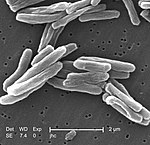Interferon gamma release assay: Difference between revisions
m Citations: [Pu171] added: pmid, pmc. You can use this bot yourself! Report bugs here. |
Abbreviation |
||
| Line 1: | Line 1: | ||
'''Interferon-γ release assays''' are medical tests used in the diagnosis of some infectious diseases, especially [[tuberculosis]]. Interferon-γ release assays rely on the fact that T-lymphocytes will release interferon-γ when exposed to specific antigens. These tests are mostly developed for the field of [[tuberculosis diagnosis]], but in theory, may be used in the diagnosis of other diseases which rely on cell-mediated immunity, e.g. [[cytomegalovirus]] and [[leishmaniasis]]. For example, in patients with [[cutaneous]] [[adverse drug reaction]]s, challenge of peripheral blood lymphocytes with the drug causing the reaction produced a positive test result for half of the drugs tested.<ref>{{cite web|url=http://www.sciencedirect.com/science?_ob=ArticleURL&_udi=B6WM8-4FC365G-J&_user=10&_coverDate=02%2F28%2F2005&_rdoc=1&_fmt=&_orig=search&_sort=d&view=c&_acct=C000050221&_version=1&_urlVersion=0&_userid=10&md5=e44c54a7f2706a47c104ffae7bbe376f|title=Clinical implications of in vitro drug-induced interferon gamma release from peripheral blood lymphocytes in cutaneous adverse drug reactions}}</ref> |
'''Interferon-γ release assays''' (IGRA) are medical tests used in the diagnosis of some infectious diseases, especially [[tuberculosis]]. Interferon-γ release assays rely on the fact that T-lymphocytes will release interferon-γ when exposed to specific antigens. These tests are mostly developed for the field of [[tuberculosis diagnosis]], but in theory, may be used in the diagnosis of other diseases which rely on cell-mediated immunity, e.g. [[cytomegalovirus]] and [[leishmaniasis]]. For example, in patients with [[cutaneous]] [[adverse drug reaction]]s, challenge of peripheral blood lymphocytes with the drug causing the reaction produced a positive test result for half of the drugs tested.<ref>{{cite web|url=http://www.sciencedirect.com/science?_ob=ArticleURL&_udi=B6WM8-4FC365G-J&_user=10&_coverDate=02%2F28%2F2005&_rdoc=1&_fmt=&_orig=search&_sort=d&view=c&_acct=C000050221&_version=1&_urlVersion=0&_userid=10&md5=e44c54a7f2706a47c104ffae7bbe376f|title=Clinical implications of in vitro drug-induced interferon gamma release from peripheral blood lymphocytes in cutaneous adverse drug reactions}}</ref> |
||
There are currently two interferon-γ release assays available for the diagnosis of tuberculosis: |
There are currently two interferon-γ release assays available for the diagnosis of tuberculosis: |
||
Revision as of 04:17, 2 October 2011
Interferon-γ release assays (IGRA) are medical tests used in the diagnosis of some infectious diseases, especially tuberculosis. Interferon-γ release assays rely on the fact that T-lymphocytes will release interferon-γ when exposed to specific antigens. These tests are mostly developed for the field of tuberculosis diagnosis, but in theory, may be used in the diagnosis of other diseases which rely on cell-mediated immunity, e.g. cytomegalovirus and leishmaniasis. For example, in patients with cutaneous adverse drug reactions, challenge of peripheral blood lymphocytes with the drug causing the reaction produced a positive test result for half of the drugs tested.[1]
There are currently two interferon-γ release assays available for the diagnosis of tuberculosis:
- QuantiFERON-TB Gold (licensed in US, Europe and Japan); and
- T-SPOT.TB, a form of ELISPOT (licensed in Europe).
The former test quantitates the amount of gamma interferon produced in response to the ESAT-6 and CFP-10 antigens from Mycobacterium tuberculosis, which are distinguishable from those present in BCG and most other non-tuberculous mycobacteria. The latter test determines the total number of individual effector T cells expressing gamma interferon.
The indications for the test are still disputed. It has been evaluated for the diagnosis of latent tuberculosis in HIV patients (who frequently have a negative Mantoux test).[2]
References
- ^ "Clinical implications of in vitro drug-induced interferon gamma release from peripheral blood lymphocytes in cutaneous adverse drug reactions".
- ^ Lawn SD, Bangani N, Vogt M; et al. (2007). "Utility of interferon-gamma ELISPOT assay responses in highly tuberculosis-exposed patients with advanced HIV infection in South Africa". BMC Infectious Diseases. 7: 99. doi:10.1186/1471-2334-7-99. PMC 2031899. PMID 17725839.
{{cite journal}}: Explicit use of et al. in:|author=(help)CS1 maint: multiple names: authors list (link) CS1 maint: unflagged free DOI (link)

